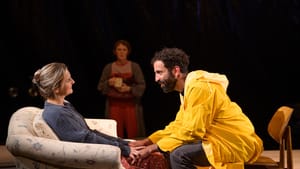Stay in the Loop
BSR publishes on a weekly schedule, with an email newsletter every Wednesday and Thursday morning. There’s no paywall, and subscribing is always free.
A day to remember
The Wilma presents Jon Fosse’s A Summer Day, translated by Sarah Cameron Sunde

Playwright Jon Fosse received the 2023 Nobel Prize in Literature, with the select committee praising his ability to “give voice to the unsayable.” The Wilma Theater offers a rare chance to experience his work with their production of A Summer Day, helmed by the company’s co-artistic director Yury Urnov.
In his home country of Norway, stagings of Fosse’s plays are second only to the nation’s most famous dramatist, Henrik Ibsen. They appear with far less frequency on this side of the Atlantic. I could only find one previous production of A Summer Day, by New York’s Rattlestick Playwrights Theater, in 2012.
I hope the Wilma’s finely wrought endeavor will spark a stateside interest in Fosse’s exquisite miniatures. Spare and devastating, A Summer Day finds in its economical dialogue and judicious use of silence a common language for the expression of grief, one that lingers as long as the expansive tragedy that forms the heart of the story.
A fateful day, then and now
The action follows a central character in decades-long stasis. Identified only as Older Woman (Krista Apple), she lives in a remote coastal village, where years earlier her husband, Asle (Jaime Maseda), disappeared during a simple sailing trip. Since that day, she’s essentially preserved herself in amber, existing but not living.
Fosse’s text, translated here by Sarah Cameron Sunde, mirrors Older Woman’s hermetic contemporary life with a snapshot of the fateful day her husband vanished. Her younger counterpart (Campbell O’Hare) bubbles with excitement, peppering her speech with questions, hopes, and dreams. She lavishes attention on her husband and a visiting friend (Brett Ashley Robinson), while the Older Woman, never leaving the stage, looks on with palpable resignation.
A smart simmer
Urnov keeps the mood at a bare simmer, in the smartest possible way. The audience knows the misfortune to come from the first moments of the play—the mounting, unspoken tension infuses every interaction. But Fosse is not the kind of dramatist who favors explosive emotional outbursts. Instead, he burrows under the surface of his characters. He shows how their choices—the ones they make and the ones foisted upon them—shape the trajectory of their fate.
In a similar fashion, Urnov creates an atmosphere where every pause speaks volumes, where every elliptical sliver of dialogue is pregnant with multiple layers of meaning. Michael Kiley’s hushed sound design and sharply deployed fragments of background noise require the audience to lean in and listen closely until you end up with the sensation that you’re eavesdropping on someone else’s grief.
Superb actors
The cast is superb from top to bottom, anchored by Apple in a career-best performance. Rather than seeming like two sides of a coin—as Robinson does with the excellent Melanye Finister, who plays the elder version of the friend—Apple and O’Hare show how a person can evolve and harden over time, from gregarious youth to stoic middle age. Lit with arresting clarity by Maria Shaplin, Apple shows how a single facial expression can speak a thousand words, as she suggests time and again the continual tax levied by the past.
In his brief appearance, Maseda renders Asle as arrogant and charming, a big personality whose absence clearly leaves a crater-sized hole in the Older Woman’s world. His is the only named character—"Asle” means donkey in Norwegian—and such a choice adds yet another piece to Fosse’s laconic puzzle. Ross Beschler also makes a sharp impression as the friend’s smarmy husband.
Grief’s unsayable truths
Misha Kachman’s set design manages the near-impossible: it makes the Wilma’s cavernous stage feel intimate. With a simple wooden catwalk and spare cottage exterior, Kachman evokes the isolated island that has, over time, become the Older Woman’s self-imposed prison. Projections by Kelly Colburn and puppetry by Ksenya Litvak inject a welcome sense of whimsy into the bleak proceedings, a reminder that humor exists even in the most dire circumstances.
Near the end of another play concerned with the complexity of grief—Thornton Wilder’s Our Town—the dead Emily Webb traumatically tries to relive a happy memory of her childhood, only to be crushed by her knowledge of the grim future. In A Summer Day, Fosse lays bare the consequence of becoming a living specter, with shattering results. The unsayable truths for which he was praised speak loud and clear in the Wilma’s production.
What, When, Where
A Summer Day. By Jon Fosse, translated by Sarah Cameron Sunde; directed by Yury Urnov. Through June 29, 2025, at the Wilma Theater, 265 S Broad Street, Philadelphia. (215) 546-7824 or wilmatheater.org.
Accessibility
The Wilma Theater is a wheelchair-accessible venue. There will be a relaxed performance of A Summer Day on Wednesday, June 18, at 2pm. Open captioning will be available on Saturday, June 28, at 8pm and Sunday, June 29, at 2pm. The June 29 performance will also be audio described.
Sign up for our newsletter
All of the week's new articles, all in one place. Sign up for the free weekly BSR newsletters, and don't miss a conversation.
 Cameron Kelsall
Cameron Kelsall